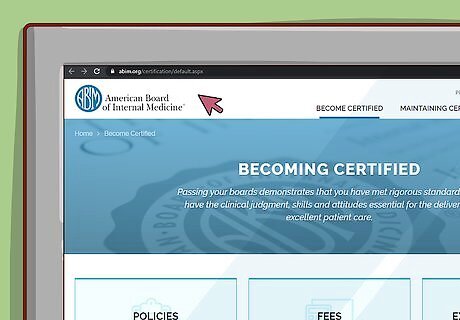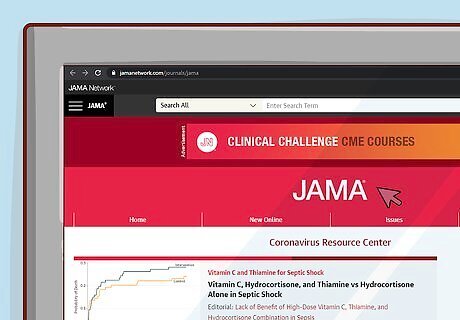
views
Meeting the Educational Requirements

Enter a pre-med program for your undergraduate degree. If you know you want to be a gastroenterologist, start as early as you can. As soon as you start college, enter into a pre-med track to prepare you for medical school. Pre-med programs usually emphasize science, biology, and lab courses. Speak with an advisor about designing a pre-med program to improve your chances of getting into medical school. To ensure you're on the right track, pay attention to how much you enjoy procedural-based medicine, where you do procedures like endoscopies, colonoscopies, and liver biopsies. Tell your pre-med adviser that you hope to become a gastroenterologist. They may be able to design a program for you that focuses on internal medicine. Nearly 50% of pre-med students major in biology. If you’re a humanities major, you can still qualify for med school, but make sure all your electives focus on science courses. If you decide you want to be a doctor after you’ve already started college, speak with an advisor about switching your program to a pre-med track. People change their concentrations all the time, so this shouldn’t be a problem. If you’ve decided in your junior or senior year, however, you may need to spend additional time in school to complete all the required prerequisite courses.

Complete volunteer work to improve your med school application. Besides good grades, medical schools also want candidates who know how to interact with patients. Gain experience outside the classroom by doing volunteer or internship work. This usually consists of handling tasks at the site for a few hours a week without pay. Look for nearby hospitals, doctor’s offices, or retirement homes and contact them to see if they’d consider taking you on as an intern. This valuable experience will look good on your med school application. Speak with your adviser to find out if there are facilities nearby that have internship programs. You may be able to get course credit for completing one. A common volunteer site is working with residents of a retirement home and help them with daily tasks. See if there is a nearby retirement community or similar organization that allows you to work with patients. Paid work also counts as relevant experience. Working as a receptionist in a nearby doctor’s office gives you practical experience, plus some money to take care of your expenses.

Get a competitive score on the MCAT. The MCAT, or Medical College Admission Test, is the standardized test for entry into med school. It's a multiple-choice test on your knowledge of life science, chemistry, biology, and social science. It also measures critical thinking and problem-solving skills. This is a difficult, day-long examination, so begin studying several months in advance. Get certified test books and complete practice exams to get acquainted with the exam material. Spend time reviewing the key concepts that you learned throughout your pre-med program to improve your chances of getting a competitive score. MCAT scores range from 472 to 528. Top scores are 514 or above, and competitive scores are between 508 and 513. Scores below this may hurt your chances of getting into medical school, so consider retaking the exam if you don’t get a good score. Required MCAT scores vary from one school to another. Look at the admission requirements for each program you’re considering to see the recommended MCAT score. Your college may offer MCAT prep classes. Take advantage of these to help prepare.

Enroll in an accredited medical school. Gastroenterologists first need to earn a general medical degree, or MD, and then specialize in internal medicine for their residencies and fellowships afterward. After sending out your med school applications, pick a reputable school that meets your needs. Complete your 4 years here to proceed towards your career as a gastroenterologist. Find a medical school that has a good history of placing graduates in internal medicine residencies. Speak with your program advisor and tell them that you’re interested in becoming a gastroenterologist. They can recommend courses and electives that prepare you for your future career. Remember that all this education will get expensive. Med school ranges from $35,000-60,000 per year, plus the cost of your undergraduate education. You’ll probably need loans to pay for it, so be prepared to spend several years paying them back after you graduate. The educational requirements vary depending on which country you’re in. For example, becoming a gastroenterologist in the UK requires a 2-year core medical training program and a 3-year acute care common stem program, a practical training program equivalent to an American residency.
Specializing in Internal Medicine

Take elective courses in internal medicine during medical school. Although medical schools don’t offer degrees in specialized subfields, you can gear your curriculum to internal medicine and gastroenterology. Speak with your advisor and develop a schedule focused on internal medicine courses and labs. Gaining this background knowledge will help with your later applications for specialized residencies and fellowships. Focus on gastroenterology for your clinical rotations as well. Your adviser can help you organize an ideal rotation schedule.

Find a residency program that specializes in gastroenterology. After graduating from medical school, complete a residency tailored to your specialized fields. Look for programs that offer residencies in gastroenterology to get specialized training in internal medicine. Check with your adviser or mentor to find programs that meet your needs. Then, when you’re approaching the end of medical school, apply for your top programs. Residencies usually work on a matching system. You submit your application materials and rank programs based on your preference. A computer then matches you with a program. Some professional organizations like the American College of Gastroenterology may also post residencies. Check on organization websites like these for more residency choices.

Complete a 3-year residency in gastroenterology. Residencies place you in a hospital or clinic to work under a licensed physician. As a resident, you’ll gain hands-on experience applying what you’ve learned in medical school to real-world situations. This is where you’ll start becoming an expert in gastroenterology and treating patients. Pay attention to everything your mentor does and ask any questions that come to mind. When you complete your residency, you’ll be a significant step closer to becoming a full gastroenterologist. Duties of a resident vary depending on the program. In the early stages, you’ll just shadow the physician on staff as they go about their daily rounds. As time goes on, you’ll have more independent tasks like interviewing patients and serving on committees. Be prepared to work long hours during your residency. Residents usually work full days and are sometimes on call during overnight shifts. This is all to prepare you for the stresses of working in the medical field. The length of the residency may vary, but 3 years is a common timeframe.

Enroll in a fellowship for gastroenterology. After your residency, you have one final course of training before becoming a licensed gastroenterologist. Fellowships provide advanced training with recognized specialists in the field. These programs expand your technical knowledge about gastrointestinal diseases and treatments, as well as give you more practice in caring for patients independently. After completing your fellowship, you’ll be eligible for board certification as a gastroenterologist. Professional organizations like the American College of Gastroenterology or American Gastroenterological Institute post fellowship positions, so look on these sites for fellowship opportunities. Fellowship applications usually involve writing a personal and professional statement, sending your transcripts and diplomas, and getting letters of recommendation from your past mentors. Fellowships may last 1-3 years, depending on the program.

Take the licensing exam from the American Board of Internal Medicine. The American Board of Internal Medicine is responsible for licensing gastroenterologists. The ABIM gives an annual exam to license new doctors of internal medicine. The exam covers all the technical information you’ve gained through medical school, your residency, and your fellowship. It’s a difficult test, but once you pass it, you’ll be a licensed gastroenterologist. The test is usually only given once a year in November, so stay on top of the registration dates so you don’t miss it. For a PDF from the ABIM on the gastroenterology exam content, visit https://www.abim.org/~/media/ABIM%20Public/Files/pdf/exam-blueprints/certification/gastroenterology.pdf. For more information about registering for the exam, visit https://www.abim.org/certification/default.aspx.
Advancing Your Career

Join professional organizations to build your network. Professional organizations like these are a key way that new doctors network and make connections. As soon as you can, join one or more professional organization and take advantage of the resources they have to offer. The key professional societies in gastroenterology are the American College of Gastroenterology, American Gastroenterological Association, American Society for Gastrointestinal Endoscopy, and American Association for the Study of Liver Diseases. If possible, take leadership roles in these organizations to increase your profile. Volunteer to edit their publications or take on administrative work to serve the community.

Find a job by searching professional organization websites. Once you've completed all your requirements and certifications, find a full-time job as a gastroenterologist. The most common places to find jobs are career boards on professional websites. Start by looking on sites like the New England Journal of Medicine, Journal of the American Medical Association, Mayo Clinic, and the American Society for Gastrointestinal Endoscopy. Once you find postings, organize and submit the required application materials. Job applications usually require an extensive curriculum vitae, personal essay, and recommendations from your former supervisors. Highlight your practical experience working with patients when writing your essay. Show potential employers that you can provide a top level of care for their patients. If you have trouble finding jobs on the common job boards, contact your old colleagues that you met during your training. They may know about job openings that aren't posted.

Speak about your residency and fellowship work during your interview. While there are a wide range of questions potential employers may ask you during an interview, most will be interested in your experience working with patients. This is the experience you gained during your fellowship and residency, so be prepared to discuss how patient care is your primary concern. Also, discuss your career goals and how this job is a perfect fit for you. Hopefully, after nailing the interview, you can officially start your career as a gastroenterologist. Remember to research the organization and ask questions during the interview. This shows that you've done a lot of work to prepare and care about the position. Show interviewers that you're not only a good doctor, but a good colleague. Be friendly and professional, and make it clear that you can get along with many different people. This is important as well. Always send a thank-you note after the interview. While thanking the interviewers, also restate your interest in the job.

Maintain your certification from the ABIM by earning points. After certifying you, the ABIM still requires activities to maintain your certification. It uses a point system, where different activities are worth a certain number of points. You have to earn some points every 2 years and a total of 100 points every 5 years to maintain your certification. Participate in approved activities to earn points. Activities like attending conferences, publishing papers, participating in lab studies, and performing outreach work are all eligible for points. Taking part in new training procedures or certifications usually earns 20 points. Passing exams every few years to check your knowledge also earns 20 points. Staying up to date on the latest research and policies can earn you points too. For example, downloading updates to the ABIM manual earns you 10 points. Contact the ABIM to find out which additional activities can earn you points.

Attend annual meetings and conferences to stay up to date. These professional organizations also sponsor annual conferences and workshops. Taking part in these activities is very important for staying informed on developments within the medical field. There may be grants or funding available to help cover the costs of attending conferences. Check with the organization you work for, or with the organization sponsoring the event. Some organizations also offer specialized conferences for early-career gastroenterologists. Consider attending some of these to meet other new members of your field.




















Comments
0 comment